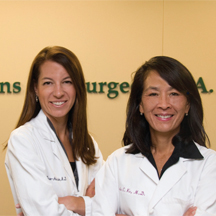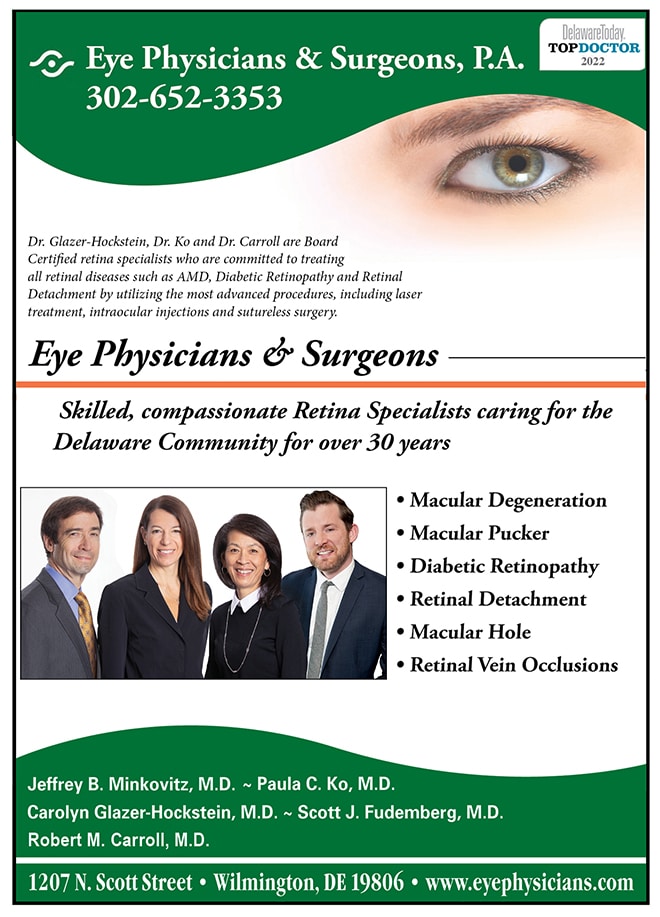Eating & Lifestyle For Healthy Eyes
By Dr. Paula C. Ko, M.D.
As retina specialists, we see many patients with eye problems that are a direct consequence of a systemic disease. In addition, there are some retinal diseases that can be modified by controlling an associated systemic disease. As a result, retina specialists commonly evaluate the patient as a whole, not just their eyes.
Diabetes, high blood pressure and high cholesterol are all systemic diseases that can directly cause significant vision loss. While surgical intervention can be very effective, we are also mindful of the root of the problem; systemic disease which is commonly not well controlled. When a patient has vision loss, it is imperative that we coordinate systemic disease care with a patient’s PCP. Educating patients about the causes of vision loss from systemic disease can not only help treat, but may prevent vision loss from happening in the first place.
Injections into the vitreous cavity of the eye is a large part of how retinal specialists treat retinal diseases today. Preventing and modifying systemic disease is equally important. The following are some diet suggestions which along with exercise, are the basic building blocks of good health!
Diabetic Retinopathy
Blindness from diabetes is more prevalent with poor diabetic control. In order to decrease the risk of blindness, the American Diabetic Association recommends that a patient keep their HBA1C less than 7. The best way to keep blood sugars low is to decrease carbohydrate consumption. Below are examples of food substitutions that have low glycemic indexes which will help keep the HBA1C low.
- Cauliflower rice instead of white rice
- Sweet potatoes instead of white potatoes
- Spaghetti squash instead of pasta
- Mashed cauliflower instead of mashed potatoes
- Roasted sweet potato fries instead of french fries
- Club soda (sparkling water) instead of regular or diet soda
Retinal Vein and Artery Occlusion
Retinal vein and artery occlusions typically occur in people who have high blood pressure, high cholesterol and diabetes. Injections can help improve vision, which is typically done on a monthly basis. Making sure that diabetes, high blood pressure, and high cholesterol are well controlled will help with the overall visual outcome. Controlling systemic disease can also help decrease the amount of injections patients will need.
- Try bison instead of beef
- Bake, broil, steam food instead of fry
- High-fiber, whole-grain foods like low-sugar cereals and vegetables
- Avocados instead of mayonnaise
- Fatty fish – e.g., salmon, mackerel, sardines, tuna
- Chicken – white meat is less fatty than dark meat
- Extra virgin olive oil
- Do not salt your food
- Avoid fast food
- Avoid processed food
- Minimize excess alcohol consumption
Age-related Macular Degeneration
High blood pressure and high cholesterol can exacerbate the complications of this very common eye disease. While there is no cure for the dry form of AMD, monthly injections are very successful in stabilizing and improving vision in wet AMD. In addition smoking can make AMD worse. The following diet is helpful for patients with AMD.
- Fish – e.g., salmon, tuna, mackerel, sardines 2-3x/week
- Green leafy vegetables like spinach, kale, collards every day
- Colorful fruits and vegetables like blueberries, blackberries, strawberries and peppers every day
Lifestyle
Brisk walking is great exercise. Doing this at least 30 minutes a day helps decrease the HBA1C, aids in weight loss and promotes circulation. Walking also decreases cholesterol and blood pressure. Exercising with a friend, spouse, or pet will statistically increase your chances of keeping up this routine. Make sure you wear your sunglasses when you are out for your brisk walk!
Quitting smoking is difficult, and in order to be successful it usually needs to be replaced with another habit. If you are a smoker, why not replace it with walking!
If you would like to keep up with healthy ideas and recipes for the eyes, as well as learn about the newest treatments available for eye disease, you can follow us on facebook, instagram, and our website at www.eyephysicians.com.
Bios
Dr. Glazer-Hockstein graduated Cum Laude from Jefferson Medical College. She was a member of the Hobart Armory Hare Honor Medical Society and was elected to the Alpha Omega Alpha Honor Society. She also received the Carol R. Mullen prize in ophthalmology. She completed her residency at the Scheie Eye Institute, University of Pennsylvania. During that time she was elected Chief Resident. After residency, Dr. Glazer-Hockstein completed a two years medical retina fellowship at the Scheie Eye Institute, University of Pennsylvania. She has published multiple articles in peer-review journals and has lectured on a variety of retinal disease subjects. Her specialization includes but is not limited to: macular degeneration, retinal vascular disease, and diabetic retinopathy.
Dr. Ko graduated Cum Laude from the Ohio State University College of Engineering and received her M.D. degree from the Ohio State University College of Medicine, with honors. Following her residency in Ophthalmology at Temple, Dr. Ko served a prestigious fellowship at Georgetown University in diseases of the retina and vitreous and is Certified by the American Board of Ophthalmology. Dr. Ko’s area of expertise is in retinal problems, especially diabetic eye disease, macular degeneration, and retinal detachment. She lectures extensively and has published many papers on these topics. Dr. Ko is active in resident training and is on staff at Temple University, as well as at the Medical Center of DE. She is at the forefront of ophthalmic technology, and utilizes the most advanced procedures, including laser treatment, suture-less surgery and intraocular injections, in the care of her patients.



